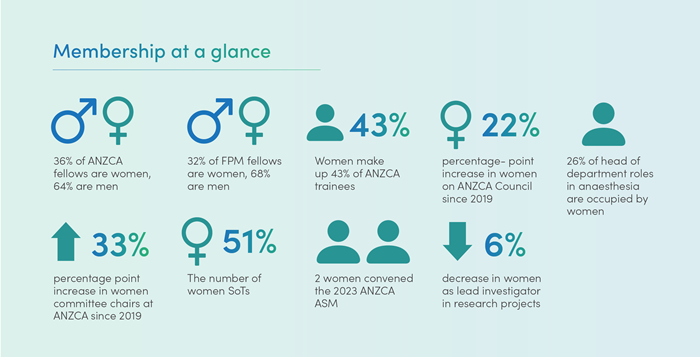Recognising the diversity of practice within careers in anaesthesia and pain medicine, our objective is to achieve visible gender equity across the following five broad areas:
- Training - program entry and completion.
- Clinical practice - opportunities across public and private healthcare sectors that are safe, rewarding, appropriately remunerated, and offer work-life balance.
- Research and education - recognition and advancement.
- Leadership - management and health advocacy.
- Continuing professional development - participation in high quality program that supports clinical and nonclinical roles
Gender metrics report
The college is committed to regularly report on gender metrics as outlined in the Gender Equity Action Plan (2023-2025). The 2023 ANZCA gender metrics report is now available and provides an overarching view of the data from 2019 -2023. The image below provides a snapshot of key data from the report..png?language=en)
Gender equity tools and resources
In March 2019, through the work of the Gender Equity Working Group, we released the Gender Equity Position Statement which states our commitment to advocate for gender equity.
In 2023, we are pleased to release our second task-oriented action plan to be delivered over the coming three years.
The action plan aligns with the five key focus areas identified in the position statement, and the ANZCA Strategic Plan (2023-2025). Regular updates on the progress of the plan will be communicated to our members, and tracked via our Professional Affairs Executive Committee.
The Gender Equity Sub-Committee is pleased to share the Unconscious Bias Toolkit. The toolkit provides an introduction to unconscious bias and explains how it influences the care our patients receive and the professional endeavours of our members. It also provides strategies and resources to identify and mitigate the effects of unconscious bias.
On completion of the unconscious bias toolkit, participants of the ANZCA and FPM CPD program can claim the ‘Practice evaluation – reviewing performance: Cultural safety’ activity.
The Gender Equity Sub-Committee (GESC), like all college committees advertises and promotes positions on the committee through an expression of interest process. Applications are sought, welcomed and encouraged from all members of the college. This process has been followed from the early days as a working group through to the current sub-committee status.
If you are interested in learning more about the work of the GESC, would like to talk though how to be involved in some of our initiatives or are considering joining the sub-committee, please email us at [email protected]
Browse our Gender Equity Libguide for an extensive range of journal articles, books, links and other resources on all things gender equity.
Women are underrepresented at conferences and meetings. Particularly as invited speakers, panellists, and convenors but also, in some cases, as delegates.
At the 2019 ANZCA Annual Scientific Meeting (ASM), 32 per cent of speakers were female and the 2020 ASM was due to be even more promising with 44 per cent of speakers being female, however the ASM was cancelled due to COVID-19.
We have been pro-active with this issue by promoting, mentoring and actively advocating for gender balance at conferences and in leadership opportunities. We encourage conference convenors to review their speaker lists with gender balance in mind.
We also provide family/carer-friendly facilities where possible, to support speakers and delegates who are caring for children.
In accordance with the ANZCA’s commitment to being an equal opportunity employer and our compliance requirements under the Workplace Gender Equality Act 2012, the college lodges an annual compliance report with the Workplace Gender Equality Agency (Agency).
The WGEA report indicates what policies, strategies and work practices the college has in place to ensure our staff are able to access and enjoy the same rewards, resources and opportunities regardless of their gender.
For more information on the Agency and reporting requirements under the Workplace Gender Equality Act 2012, please visit the website.
Related resources
This participant information sheet is designed to assist with the ethics application and to be used as a guide. Please chose the most appropriate format depending on local ethics requirements.
Learn more
Learn about ANZCA's commitment to ensuring that a diversity of voices can be heard at its events.
Find the answers to frequently asked questions about gender equity.
View our International Women's Day campaigns from 2024-22.
We strongly endorse gender equity because of its ethical, social, and economic benefits. The GESC reports its activities and initiatives to the Professional Affairs Executive Committee (PAEC).
